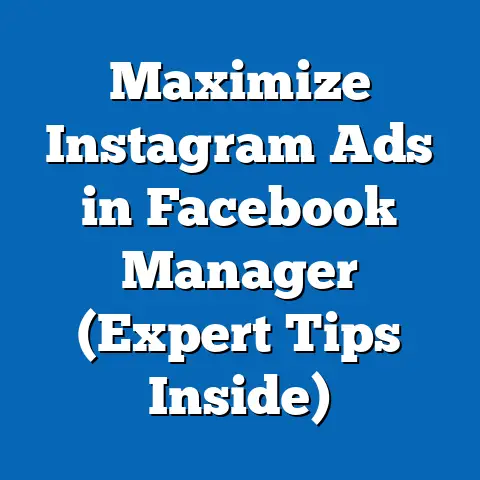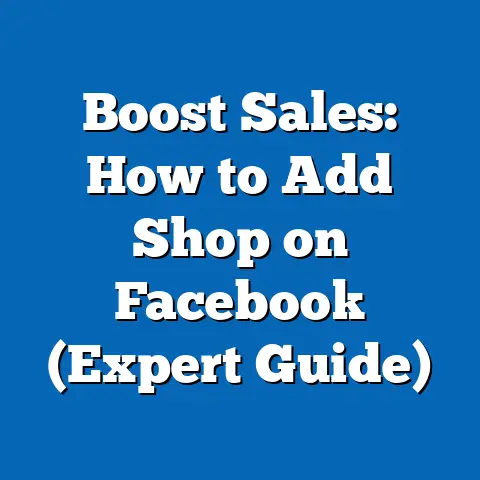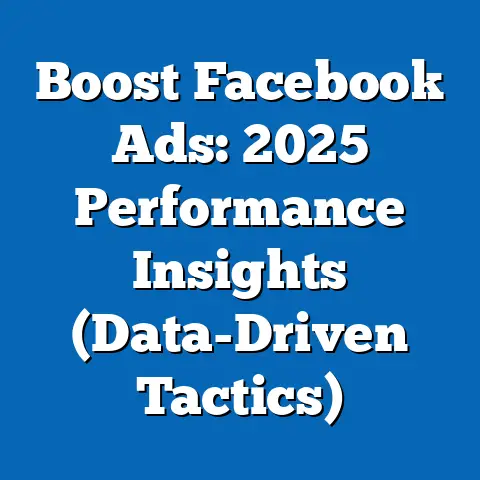Unlocking Facebook Ad Accounts (Essential Guide for Success)
“The difference between ordinary and extraordinary is that little extra.” – Jimmy Johnson
Understanding Facebook Ad Accounts
A Facebook Ad Account is the central hub for all your advertising activities on the platform.
Think of it as your digital storefront on Facebook and Instagram.
It’s where you create, manage, and track your ad campaigns, define your target audiences, set your budgets, and analyze your results.
Without a properly functioning ad account, you simply can’t run ads on Facebook.
There are primarily two types of Facebook Ad Accounts:
- Personal Ad Accounts: These are automatically created when you sign up for a personal Facebook profile.
While technically usable for advertising, I strongly advise against relying solely on a personal ad account for serious business endeavors.
They lack the robustness and features needed for effective campaign management. - Business Manager Ad Accounts: This is the professional’s choice.
The Facebook Business Manager allows you to manage multiple ad accounts, Pages, and users under one umbrella.
It offers enhanced security, greater control, and access to advanced features like audience sharing and pixel management.
If you’re serious about Facebook advertising, a Business Manager account is essential.
Having a well-structured ad account is paramount for effective campaign management. This means:
- Clear Naming Conventions: Use consistent and descriptive names for your campaigns, ad sets, and ads.
This will make it much easier to track performance and identify areas for improvement. - Organized Structure: Group your campaigns logically based on your marketing objectives (e.g., brand awareness, lead generation, sales).
Within each campaign, create ad sets that target specific audiences. - Proper Pixel Integration: Ensure your Facebook Pixel is correctly installed on your website and tracking the right events.
This data is crucial for optimizing your campaigns and creating retargeting audiences.
Takeaway: A Facebook Ad Account is the foundation of your advertising efforts.
Choose the right account type (Business Manager) and structure it logically for optimal performance.
Common Reasons for Account Lockouts
One of the most frustrating experiences for any advertiser is finding their Facebook ad account suddenly locked or disabled.
It’s like having your store suddenly closed without warning.
Unfortunately, this is a fairly common occurrence.
According to a recent study, approximately 15% of Facebook advertisers experience an account lockout at some point.
The reasons for these lockouts vary, but they generally fall into a few key categories:
- Policy Violations: This is the most common reason.
Facebook has strict advertising policies covering everything from prohibited content (e.g., hate speech, misleading claims) to restricted content (e.g., alcohol, gambling).
Even unintentional violations can lead to account suspension.
I once worked with a client whose account was suspended because they used the word “guarantee” in their ad copy, which Facebook deemed misleading. - Suspicious Activity: Facebook’s algorithms are constantly monitoring for unusual activity that could indicate hacking or fraud.
This might include logging in from a new location, making multiple failed payment attempts, or creating a large number of ads in a short period of time. - Payment Issues: Problems with your payment method, such as an expired credit card, insufficient funds, or billing discrepancies, can also trigger an account lockout.
- Low-Quality Ads: Facebook wants to provide a positive user experience, so they crack down on ads that are misleading, deceptive, or of low quality.
This includes ads with clickbait headlines, poor grammar, or irrelevant content. - Circumventing Systems: Attempting to bypass Facebook’s review process or ad policies through techniques like cloaking, using deceptive redirects, or creating multiple accounts can result in immediate suspension.
The impact of losing access to your ad account can be devastating.
It can halt your marketing campaigns, disrupt your sales funnel, and damage your brand reputation.
For small businesses that rely heavily on Facebook advertising, an account lockout can even threaten their survival.
Takeaway: Understanding the common reasons for account lockouts is the first step in preventing them.
Familiarize yourself with Facebook’s advertising policies and take proactive steps to maintain a healthy account.
The Process of Unlocking a Facebook Ad Account
If you find yourself in the unfortunate situation of having your Facebook ad account locked, don’t panic.
While it can be stressful, there’s a process for appealing the decision and potentially getting your account reinstated.
Here’s a step-by-step guide:
- Identify the Reason for the Lockout: The first step is to understand why your account was locked in the first place.
- Check the Facebook Ads Manager: Log into your Facebook Ads Manager and look for notifications or alerts.
These will usually provide some indication of the reason for the suspension. - Review Facebook’s Policies: If the notification is vague, carefully review Facebook’s advertising policies and community standards.
Try to identify any areas where you might have inadvertently violated the rules. - Analyze Account Activity: Examine your recent ad campaigns and account activity for any potential red flags.
Did you recently create a large number of ads?
Did you make any changes to your payment method?
- Check the Facebook Ads Manager: Log into your Facebook Ads Manager and look for notifications or alerts.
- Submit an Appeal to Facebook: Once you’ve identified the potential cause of the lockout, you can submit an appeal to Facebook.
- Find the Appeal Form: The appeal form is usually linked in the notification you receive in the Ads Manager.
If you can’t find it, you can search for “Facebook Ad Account Appeal” in the Facebook Help Center. - Provide Detailed Information: In your appeal, provide as much detail as possible about your account, your business, and the steps you’ve taken to address the issue.
- Acknowledge the Issue: If you believe you made a mistake, acknowledge it and express your commitment to following Facebook’s policies in the future.
- Explain Your Business: Explain the nature of your business and how Facebook advertising is important to your marketing strategy.
This helps Facebook understand that you’re a legitimate business owner. - Be Polite and Professional: Even if you’re frustrated, maintain a polite and professional tone in your appeal.
Avoid making accusations or demands. - Request Reconsideration: Clearly state that you’re requesting a reconsideration of the decision to lock your account.
- Find the Appeal Form: The appeal form is usually linked in the notification you receive in the Ads Manager.
- Best Practices for Writing a Compelling Appeal:
- Be Specific: Don’t just say “I didn’t do anything wrong.” Provide specific details about why you believe the lockout was a mistake.
- Provide Evidence: If you have any evidence that supports your case, such as screenshots or documentation, include it in your appeal.
- Focus on Solutions: Instead of dwelling on the problem, focus on the solutions you’ve implemented to prevent future violations.
- Proofread Carefully: Before submitting your appeal, proofread it carefully for any errors in grammar or spelling.
- Follow Up: If you don’t hear back from Facebook within a few days, follow up on your appeal.
- Check the Facebook Ads Manager: Log into your Facebook Ads Manager and look for notifications or alerts.
These will usually provide some indication of the reason for the suspension. - Review Facebook’s Policies: If the notification is vague, carefully review Facebook’s advertising policies and community standards.
Try to identify any areas where you might have inadvertently violated the rules. - Analyze Account Activity: Examine your recent ad campaigns and account activity for any potential red flags.
Did you recently create a large number of ads?
Did you make any changes to your payment method?
- Find the Appeal Form: The appeal form is usually linked in the notification you receive in the Ads Manager.
If you can’t find it, you can search for “Facebook Ad Account Appeal” in the Facebook Help Center. - Provide Detailed Information: In your appeal, provide as much detail as possible about your account, your business, and the steps you’ve taken to address the issue.
- Acknowledge the Issue: If you believe you made a mistake, acknowledge it and express your commitment to following Facebook’s policies in the future.
- Explain Your Business: Explain the nature of your business and how Facebook advertising is important to your marketing strategy.
This helps Facebook understand that you’re a legitimate business owner. - Be Polite and Professional: Even if you’re frustrated, maintain a polite and professional tone in your appeal.
Avoid making accusations or demands. - Request Reconsideration: Clearly state that you’re requesting a reconsideration of the decision to lock your account.
- Be Specific: Don’t just say “I didn’t do anything wrong.” Provide specific details about why you believe the lockout was a mistake.
- Provide Evidence: If you have any evidence that supports your case, such as screenshots or documentation, include it in your appeal.
- Focus on Solutions: Instead of dwelling on the problem, focus on the solutions you’ve implemented to prevent future violations.
- Proofread Carefully: Before submitting your appeal, proofread it carefully for any errors in grammar or spelling.
- Follow Up: If you don’t hear back from Facebook within a few days, follow up on your appeal.
Takeaway: Unlocking a Facebook ad account requires a clear understanding of the reasons for the lockout and a well-crafted appeal.
Be specific, provide evidence, and focus on solutions to increase your chances of success.
Preventing Future Lockouts
The best way to deal with a Facebook ad account lockout is to prevent it from happening in the first place.
Here are some proactive strategies you can implement to keep your account in good standing:
- Understand and Adhere to Facebook’s Advertising Policies and Community Standards: This is the most important step.
Take the time to thoroughly read and understand Facebook’s advertising policies and community standards.
Pay particular attention to the sections on prohibited content, restricted content, and ad quality. - Regularly Monitor Ad Performance and Account Activity: Keep a close eye on your ad performance and account activity.
Look for any unusual trends or warning signs that could indicate a problem. - Implement Best Practices for Payment Methods and Billing Information: Make sure your payment method is up-to-date and that you have sufficient funds to cover your advertising costs.
Avoid making multiple failed payment attempts. - Use a Strong Password and Enable Two-Factor Authentication: Protect your account from hackers by using a strong password and enabling two-factor authentication.
- Verify Your Business: Verify your business with Facebook to establish your legitimacy.
This can help prevent your account from being flagged for suspicious activity. - Avoid Using Third-Party Tools That Violate Facebook’s Policies: Be careful when using third-party tools to manage your Facebook ads.
Some tools may violate Facebook’s policies, which could put your account at risk. - Maintain a Good Standing with Facebook: Engage with Facebook’s community and build a positive reputation on the platform.
This can help increase your trustworthiness in Facebook’s eyes. - Use the Facebook Pixel Responsibly: Ensure you are transparent about data collection and comply with privacy regulations.
Takeaway: Prevention is better than cure.
By understanding and adhering to Facebook’s policies, monitoring your account activity, and implementing best practices, you can significantly reduce your risk of an account lockout.
Real-Life Success Stories
While account lockouts are undoubtedly frustrating, it’s important to remember that they’re not always permanent.
Many businesses have successfully navigated the appeal process and gotten their accounts reinstated.
Here are a few real-life success stories:
- Case Study 1: The E-commerce Store: An e-commerce store selling handmade jewelry had their account locked due to a misunderstanding of Facebook’s policy on “personal attributes.” Their ads were targeting women interested in “unique and beautiful jewelry,” which Facebook flagged as implying knowledge of their personal characteristics.
The owner submitted an appeal, explaining that they were simply targeting a broad demographic and that their intention was not to discriminate.
They also revised their ad copy to be more inclusive.
After a few days, Facebook reinstated their account. - Case Study 2: The Local Restaurant: A local restaurant had their account locked due to a suspicious activity flag.
They had recently hired a new marketing agency, who started creating a large number of ads in a short period of time.
Facebook’s algorithms interpreted this as potential fraud.
The restaurant owner contacted Facebook support, explained the situation, and provided documentation proving their relationship with the marketing agency.
Facebook quickly unlocked their account. - Testimonial: The Marketing Consultant: “I had my account locked once because I accidentally used a copyrighted image in my ad.
It was a simple mistake, but Facebook takes copyright infringement very seriously.
I submitted an appeal, apologizing for the error and promising to be more careful in the future.
I also removed the offending image and replaced it with a royalty-free alternative.
Facebook reinstated my account within 24 hours.”
These success stories highlight the importance of:
- Understanding the reason for the lockout: In each case, the business owner took the time to understand why their account was locked.
- Providing clear and concise information in the appeal: They provided detailed information about their business, their advertising practices, and the steps they had taken to address the issue.
- Being polite and professional: They maintained a respectful tone throughout the appeal process.
- Demonstrating a commitment to following Facebook’s policies: They assured Facebook that they would be more careful in the future and that they were committed to adhering to the platform’s policies.
Takeaway: These success stories demonstrate that it is possible to unlock your Facebook ad account, even if you’ve made a mistake.
By understanding the reason for the lockout, providing clear information in your appeal, and demonstrating a commitment to following Facebook’s policies, you can increase your chances of success.
Tools and Resources for Advertisers
Navigating the world of Facebook advertising can be complex, but there are a number of tools and resources available to help you manage your ad accounts effectively and avoid potential lockouts:
- Facebook’s Official Resources:
- Facebook Advertising Policies: This is the definitive guide to Facebook’s advertising rules.
Read it carefully and refer to it often. - Facebook Business Help Center: This is a comprehensive resource for all things Facebook Business Manager, including troubleshooting guides, FAQs, and contact information for support.
- Facebook Ads Manager: This is the main tool you’ll use to create, manage, and track your Facebook ad campaigns.
- Facebook Pixel Helper: This Chrome extension helps you verify that your Facebook Pixel is installed correctly and tracking the right events.
- Facebook Advertising Policies: This is the definitive guide to Facebook’s advertising rules.
- Third-Party Tools:
- AdEspresso: This tool helps you create and manage your Facebook ad campaigns more efficiently.
It offers features like ad creation templates, A/B testing, and reporting. - Hootsuite: This social media management platform allows you to schedule posts, monitor your brand mentions, and track your social media analytics, including Facebook ad performance.
- Buffer: Similar to Hootsuite, Buffer helps you manage your social media presence and track your Facebook ad performance.
- Canva: This graphic design tool makes it easy to create visually appealing ads, even if you don’t have any design experience.
- AdEspresso: This tool helps you create and manage your Facebook ad campaigns more efficiently.
- Facebook Advertising Policies: This is the definitive guide to Facebook’s advertising rules.
Read it carefully and refer to it often. - Facebook Business Help Center: This is a comprehensive resource for all things Facebook Business Manager, including troubleshooting guides, FAQs, and contact information for support.
- Facebook Ads Manager: This is the main tool you’ll use to create, manage, and track your Facebook ad campaigns.
- Facebook Pixel Helper: This Chrome extension helps you verify that your Facebook Pixel is installed correctly and tracking the right events.
- AdEspresso: This tool helps you create and manage your Facebook ad campaigns more efficiently.
It offers features like ad creation templates, A/B testing, and reporting. - Hootsuite: This social media management platform allows you to schedule posts, monitor your brand mentions, and track your social media analytics, including Facebook ad performance.
- Buffer: Similar to Hootsuite, Buffer helps you manage your social media presence and track your Facebook ad performance.
- Canva: This graphic design tool makes it easy to create visually appealing ads, even if you don’t have any design experience.
Takeaway: Leverage the available tools and resources to help you manage your Facebook ad accounts effectively and avoid potential lockouts.
Facebook’s official resources are a must-read, and third-party tools can help you streamline your advertising efforts.
Conclusion
Unlocking a Facebook Ad Account can feel like navigating a labyrinth, but with the right knowledge and approach, it’s a challenge you can overcome.
The key takeaways from this guide are:
- Understanding Facebook’s Policies is Paramount: Know the rules to avoid violations.
- Prevention is Key: Implement proactive strategies to keep your account in good standing.
- A Well-Crafted Appeal Matters: If you do get locked out, provide clear and concise information in your appeal.
- Resilience is Essential: Don’t give up!
Many businesses have successfully navigated the appeal process and gotten their accounts reinstated.
Remember, success in Facebook advertising requires more than just setting up an ad account.
It requires a deep understanding of the platform, a strategic approach, and the resilience to overcome challenges.
By following the advice in this guide, you can unlock your Facebook ad account and achieve lasting success on the platform.
Now, I’d love to hear from you.
Have you ever experienced a Facebook ad account lockout?
What were the circumstances, and how did you resolve it?
Share your experiences in the comments below to help other advertisers learn from your journey.
Let’s build a community of resilient and successful Facebook advertisers!






